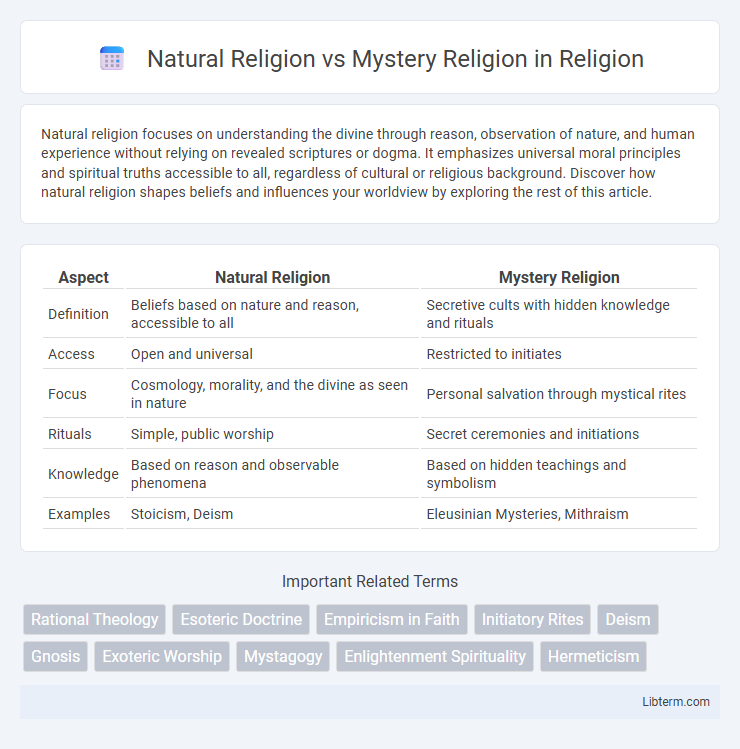Natural religion focuses on understanding the divine through reason, observation of nature, and human experience without relying on revealed scriptures or dogma. It emphasizes universal moral principles and spiritual truths accessible to all, regardless of cultural or religious background. Discover how natural religion shapes beliefs and influences your worldview by exploring the rest of this article.
Table of Comparison
| Aspect | Natural Religion | Mystery Religion |
|---|---|---|
| Definition | Beliefs based on nature and reason, accessible to all | Secretive cults with hidden knowledge and rituals |
| Access | Open and universal | Restricted to initiates |
| Focus | Cosmology, morality, and the divine as seen in nature | Personal salvation through mystical rites |
| Rituals | Simple, public worship | Secret ceremonies and initiations |
| Knowledge | Based on reason and observable phenomena | Based on hidden teachings and symbolism |
| Examples | Stoicism, Deism | Eleusinian Mysteries, Mithraism |
Introduction to Natural and Mystery Religions
Natural religion is based on universal truths and reason, emphasizing belief systems derived from nature and human experience without reliance on revealed texts. Mystery religions, originating in the ancient Mediterranean, involve secret rituals and esoteric knowledge accessible only to initiates. These two forms of religion contrast in their approach to divine understanding, with natural religion focusing on observable reality and mystery religions emphasizing mystical experiences and hidden wisdom.
Defining Natural Religion
Natural Religion centers on the belief in a divine order discoverable through human reason and observation of the natural world, emphasizing universal moral principles inherent in nature. It contrasts with Mystery Religions, which rely on secret rites, revelations, and esoteric knowledge accessible only to initiates. Natural Religion seeks to understand the divine through rational inquiry and common experience rather than mystical or hidden teachings.
Understanding Mystery Religion
Mystery religions centered on secretive rituals and esoteric knowledge accessible only to initiates, contrasting with natural religion's emphasis on universal truths derived from nature and reason. These religions often featured symbolic practices, mythologies, and initiation ceremonies designed to offer personal transformation and a deeper spiritual connection. Understanding mystery religion requires exploring its role in ancient societies as a means of experiencing divine mysteries beyond rational comprehension and public worship.
Historical Origins and Development
Natural religion traces its origins to ancient philosophical inquiries and indigenous spiritual practices emphasizing a universal, rational understanding of divinity through nature and reason. Mystery religions, emerging prominently in the Hellenistic period, developed as secret cults like the Eleusinian and Dionysian mysteries, offering initiates esoteric knowledge and ritual experiences promising personal salvation and afterlife. Both religious forms significantly influenced the spiritual landscape of the Mediterranean world, shaping religious thought and practice from antiquity through late antiquity.
Core Beliefs and Practices
Natural religions emphasize understanding the divine through reason, observation of nature, and inherent moral order, teaching beliefs based on natural law and universal ethics. Mystery religions center on secret rituals, esoteric knowledge, and initiation ceremonies designed to establish a personal and transformative relationship with deities. Core practices of natural religions often include prayer, meditation, and ethical living, while mystery religions focus on symbolic rites, sacred myths, and communal participation in mysteries.
Rituals: Public Expression vs. Secret Ceremonies
Natural Religion emphasizes public rituals that engage entire communities, such as festivals, prayers, and sacrifices performed openly to honor deities and reinforce social cohesion. Mystery Religion centers on secret ceremonies accessible only to initiates, involving symbolic rites and esoteric knowledge that promise personal salvation or enlightenment. These contrasting ritual approaches highlight Natural Religion's focus on collective public worship versus Mystery Religion's emphasis on exclusive, hidden spiritual experiences.
Role of Nature and the Supernatural
Natural religion emphasizes the role of nature as a direct manifestation of the divine, grounding belief systems in observable natural phenomena and human reason without reliance on supernatural revelation. Mystery religions, by contrast, center on esoteric supernatural experiences and secret rites that promise personal salvation or transformation beyond the natural world. The natural religion approach interprets nature as a rational, accessible source of spiritual truth, while mystery religions prioritize hidden, mystical knowledge conveyed through divine intervention and initiatory practices.
Social Structure and Membership
Natural religion typically emphasizes communal participation based on shared beliefs about the natural world and moral order, fostering inclusivity and cohesion within a society. Mystery religions often involve secretive initiation rites and restricted membership, creating exclusive social hierarchies centered around esoteric knowledge and personal spiritual transformation. This exclusivity in mystery religions contrasts with the open, community-oriented social structures of natural religions, highlighting differences in access to religious experiences and social integration.
Influence on Philosophy and Culture
Natural religion, grounded in reason and observable nature, significantly shaped classical philosophy by promoting ethical frameworks based on universal principles and human rationality. Mystery religions, with their esoteric rituals and emphasis on personal spiritual experience, influenced cultural practices by fostering communal identity and offering emotional solace through secret knowledge. Together, these religious paradigms contributed to the development of Western thought, blending rational inquiry with mystical elements in philosophy and societal rituals.
Legacy and Modern Interpretations
Natural religion, grounded in universal moral principles and reason, has influenced modern ethical frameworks and interfaith dialogues by emphasizing innate human spirituality and the pursuit of truth through observation and reflection. Mystery religions, with their secretive rites and emphasis on personal transformation, have inspired contemporary spiritual movements and esoteric traditions that focus on inward experience and symbolic knowledge. The legacy of these religious forms is evident in the ongoing tension between rational theology and mystical practice within modern religious and philosophical discourse.
Natural Religion Infographic

 libterm.com
libterm.com